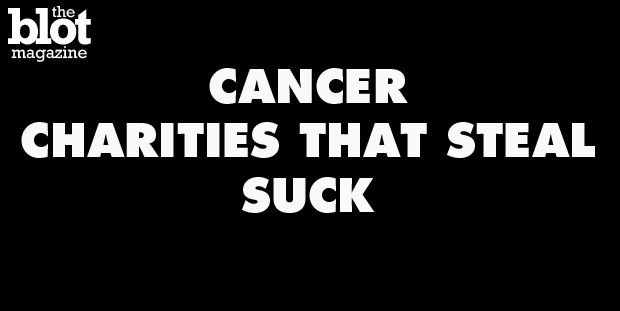Because it perpetrated a sick fraud, these cancer charities were actually a cancer.
The Cancer Fund of America (CFA) stole nearly $200 million in donations in one of the largest charity fraud cases ever, a complaint from the Federal Trade Commission (FTC) has alleged.
The federal agency responsible for protecting consumers from anticompetitive, deceptive and unfair business blasted the “sham charities” in a vicious indictment of their practices. Altogether, the group comprised of four charitable organizations supposedly devoted to assisting in the fight against breast cancer and other forms of the disease is charged with improperly using more than $187 million of donations. Instead of putting the money toward patients or research, the groups are charged with fraudulently spending the monies on cars, trips, luxury cruises, college tuition, gym memberships, jet ski jaunts, sporting events, concert tickets and dating site memberships.
Named in the FTC complaint were CFA, Cancer Support Services Inc. (CSS), Children’s Cancer Fund of America Inc. (CCFOA) and the Breast Cancer Society Inc. (BCS). The umbrella group, CFA, was opened in 1987 by James T. Reynolds Sr. He and his son, James T. Reynolds II are alleged to have overseen the massive fraud. Named in the suit are Reynolds Sr., president of CSS; Kyle Effler, CSS’ chief financial officer and former president; Rose Perkins, CCFOA’s president and executive director; and Reynolds II, executive director and former president of BCS.
The FTC statement alleges the charities “operated as personal fiefdoms characterized by rampant nepotism, flagrant conflicts of interest, and excessive insider compensation, with none of the financial and governance controls that any bona fide charity would have adopted.” The defendants were also accused of using the charities as lucrative employment for friends and family members.
“Cancer is a debilitating disease that impacts millions of Americans and their families every year,” Director of the FTC’s Bureau of Consumer Protection Jessica Rich said in a statement. “The defendants’ egregious scheme effectively deprived legitimate cancer charities and cancer patients of much-needed funds and support. The defendants took in millions of dollars in donations meant to help cancer patients, but spent it on themselves and their fundraisers. Our state partners are acting to end this appalling scheme.”
Read more: Three Crazy Causes People Actually Got Behind
All 50 states and Washington, D.C. are involved in the lawsuit, which operate in several states including Virginia and South Carolina. In all, 58 law enforcement agencies cooperated in the fraud investigation and assisted in bringing charges to bear.
“The allegations of fundraising for personal gain in the name of children with cancer and women battling breast cancer are simply shameful,” Virginia Attorney General Mark Herring said in a statement. “This is the first time the FTC, all 50 states, and the District of Columbia have filed a joint enforcement action alleging deceptive solicitations by charities and I hope it serves as a strong warning for anyone trying to exploit the kindness and generosity of others.”
Defendants claimed the donations were spent on hospice care, pain medication, transportation to chemotherapy and other services. The lawsuit details the charity scheme, which avoided detection by falsifying financial reports, inflating revenues and overestimating gift donations that included plastic cutlery and Little Debbie snacks meant for delivery to patients. In fact, these were diverted to other groups with no connection to charity or cancer relief.
The lawsuit further charges that defendants lied about revenues. The FTC said the charities skimmed the money by reporting in public documents more than $223 million of in-kind donations to make the entire pot of gold appear larger.
Two charities and three individuals — BCS and CCFOA and Effler, Perkins and Reynolds II — have already agreed to settle out of court. Under the proposed settlement, drivers of the fraud will receive bars from fundraising, charity management and supervision of charitable assets. In addition, CCFOA and BCS will be shuttered. Litigation against CFA, CSS and Reynolds Sr. is ongoing.
The supposed mission to assist cancer patients is clearly a noble one, but these charities were, in fact, used to commit an unconscionable, years-long and bald-faced fraud that profited off the suffering of the sick and the generosity of others. On its website, the FTC provides guides to help consumers avoid these bad actors. There are also links to other resources to help individuals and business direct donations to legitimate organizations as well.
Unfortunately, as shown by this case, charity fraud continues to occur. It’s sad fact that some people will seemingly do anything, no matter how abhorrent, for a buck. But hopefully with more information available online now than ever, concerned citizens have many more tools at hand to help them decide if an organization is deserving of donation — or a fraud.
Noah Zuss is a reporter for TheBlot Magazine.






